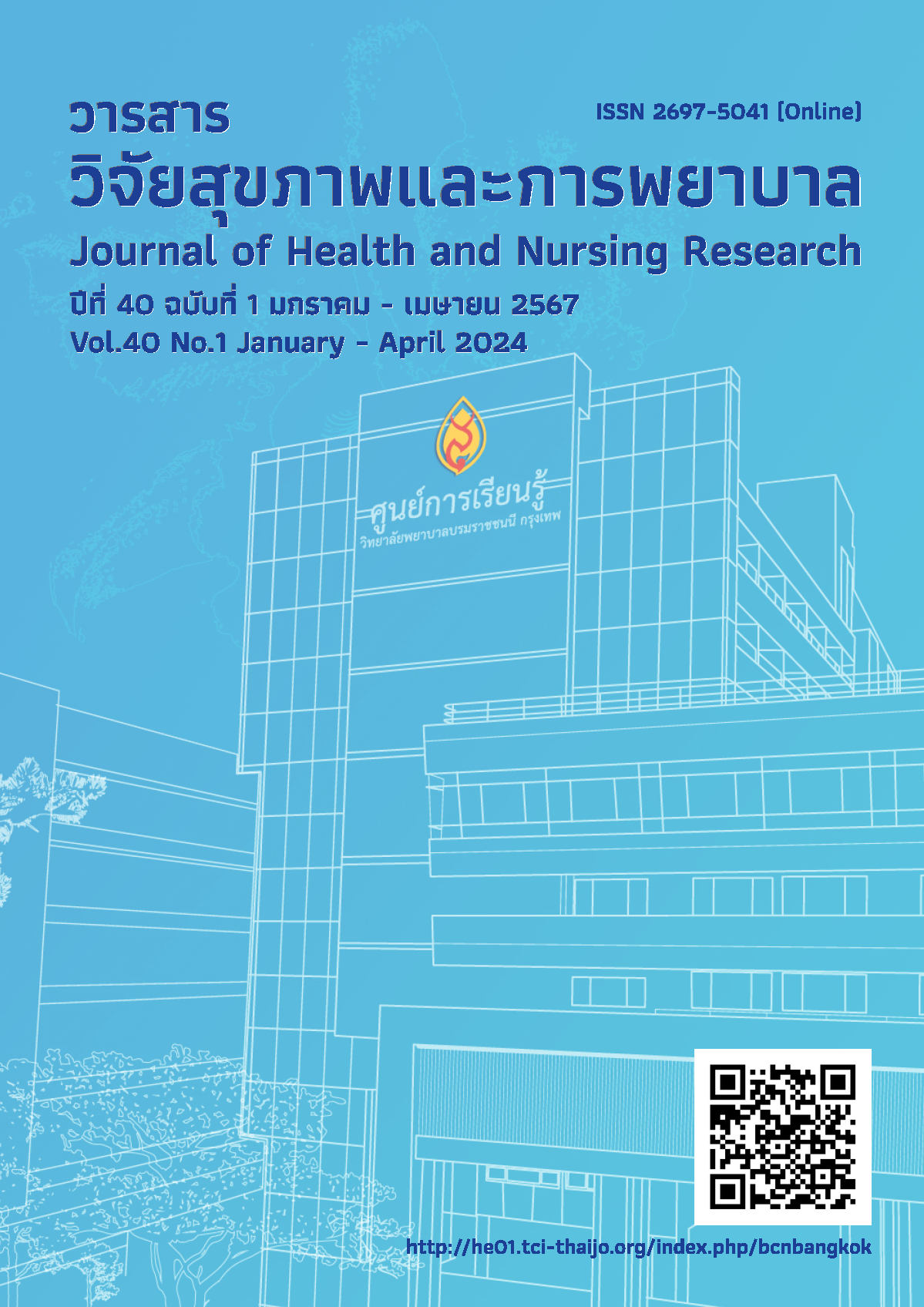ผลของโปรแกรมการจัดการตนเองของบุคคลและครอบครัว ต่อพฤติกรรมการบริโภคอาหารและภาวะโภชนาการ ในผู้ป่วยโรคไตเรื้อรังระยะสุดท้ายที่ได้รับการฟอกเลือดด้วยเครื่องไตเทียม
คำสำคัญ:
โปรแกรมการจัดการตนเองของบุคคลและครอบครัว , พฤติกรรมการบริโภคอาหาร , ภาวะโภชนาการบทคัดย่อ
บทนำ: ผู้ป่วยโรคไตเรื้อรังระยะสุดท้ายที่ได้รับการฟอกเลือดด้วยเครื่องไตเทียมต้องมีพฤติกรรมการบริโภคอาหารที่ถูกต้องเหมาะสมเพื่อให้เกิดภาวะโภชนาการที่ดี
วัตถุประสงค์การวิจัย: เพื่อศึกษาผลของโปรแกรมการจัดการตนเองของบุคคลและครอบครัวต่อพฤติกรรมการบริโภคอาหารและภาวะโภชนาการในผู้ป่วยโรคไตเรื้อรังระยะสุดท้ายที่ได้รับการฟอกเลือดด้วยเครื่องไตเทียม
ระเบียบวิธีวิจัย: การวิจัยกึ่งทดลองแบบ 2 กลุ่ม วัดซ้ำ ในผู้ป่วยโรคไตเรื้อรังระยะสุดท้ายที่ได้รับการฟอกเลือดด้วยเครื่องไตเทียม ที่ห้องไตเทียม โรงพยาบาลกุมภวาปี จำนวน 32 ราย และผู้ดูแล แบ่งเป็นกลุ่มละ 16 ราย กลุ่มทดลองได้รับโปรแกรมการจัดการตนเองของบุคคลและครอบครัวตามแนวคิดของของ Ryan & Sawin ประกอบด้วย 1) การส่งเสริมความรู้ ความเชื่อ 2) การพัฒนาความสามารถในการกำกับตนเอง และ 3) การเข้าถึงสิ่งอำนวยความสะดวกทางสังคม กลุ่มควบคุมได้รับการพยาบาลตามปกติ รวบรวมข้อมูลโดย แบบบันทึกข้อมูลส่วนบุคคล แบบประเมินพฤติกรรมการบริโภคอาหาร แบบประเมิน Malnutrition Inflammation Score วิเคราะห์ข้อมูลด้วยสถิติเชิงพรรณนา และสถิติเปรียบเทียบ
ผลการวิจัย: หลังการทดลอง กลุ่มทดลองมีคะแนนพฤติกรรมการบริโภคอาหารสูงกว่าก่อนได้รับโปรแกรม อย่างมีนัยสำคัญทางสถิติ (p < .01) และสูงกว่ากลุ่มควบคุม อย่างมีนัยสำคัญทางสถิติ (p < .001) สัดส่วนระดับโภชนาการของกลุ่มทดลองแตกต่างจากกลุ่มควบคุม อย่างมีนัยสำคัญทางสถิติ (p < .05) แต่สัดส่วนระดับโภชนาการของกลุ่มทดลองไม่แตกต่างจากก่อนได้รับโปรแกรม
สรุปผล: โปรแกรมการจัดการตนเองของบุคคลและครอบครัวมีประสิทธิภาพในการปรับเปลี่ยนพฤติกรรมการบริโภคอาหารและส่งเสริมให้ระดับโภชนาการดีขึ้น
ข้อเสนอแนะ: พยาบาลที่จะนำโปรแกรมการจัดการตนเองของบุคคลและครอบครัวไปใช้ควรได้รับการฝึกฝนเพื่อให้สามารถใช้โปรแกรมนี้ได้อย่างมีประสิทธิภาพ
Downloads
เอกสารอ้างอิง
The Nephrology Society of Thailand. Hemodialysis clinical practice recommendation 2022. Bangkok: text and journal publication; 2022. (in Thai)
National Health Security Office. CKD report [Internet]. 2022 [cited 2023 Aug 4]. Available from: https://eng.nhso.go.th/assets/portals/1/files/Nhso%20annual%20report%202022.pdf
The Nephrology Society of Thailand. Guide to hemodialysis and plasma filtration treatment for kidney disease patients 2018 [Internet]. 2018 [cited 2023 Aug 4] Available from: https://www.nephrothai.org/wp-content/uploads/2021/10/95-2561.pdf (in Thai)
Supasyndh O. Nutrition in dialysis. In: Satirapoj B, Chaiprasert A, Nata N, Supasyndh O, editors. Manual of dialysis. Bangkok; 2018. p. 520-32. (in Thai)
Zhou M, Gu X, Cheng K, Wang Y, Zhang N. Exploration of symptom clusters during hemodialysis and symptom network analysis of older maintenance hemodialysis patients: a cross-sectional study. BMC Nephrology. 2023 Apr 27;24(1):115. p. 1-24.
Jiwakanon S. Nutritional management in chronic hemodialysis patients. In: Gojaseni P, Tiranathanagul K, Chanchairujira T, Takarnvanich T, Pajaree T, Vareesangthip K, editors. Essentials in hemodialysis. Bangkok: text and journal publication; 2016. P. 328-50. (in Thai)
Society of Parenteral and Enteral Nutrition of Thailand. Clinical practice recommendation for nutritional management in adult kidney patients 2018. (in Thai)
Salame C, Eaton S, Grimble G, Davenport A. Protein losses and urea nitrogen underestimate total nitrogen losses in peritoneal dialysis and hemodialysis patients. Journal of Renal Nutrition. 2018 Sep 1;28(5):317–23.
Jayanama K. Pathophysiology of protein energy metabolism in chronic kidney disease. In: Kantachuvesiri S, Chancharoenthana W, Kiattisunthorn K, Kochasenee P, Chailimpamontree W, Trakarnvanich T. Chronic kidney disesae textbook. 2nd. Bangkok: Text and Journal Publication; 2019. P. 159-73 (in Thai)
Akpele L, Bailey JL. Nutrition counseling impacts serum albumin levels. Journal of Renal Nutrition. 2004;14(3):143–8.
Wungrath J, Rerkkasem K, Saengyo S, Pongtam S, Pinmars N, Chanwikrai Y. Nutrient Intake Characteristics of End Stage Renal Disease with Hemodialysis Patients at Maharaj Nakorn Chiang Mai Hospital. Journal of Community Development and Life Quality 2019;7(1):81-92. (in Thai)
Wungrath J, Rerkkasem K, Saengyo S, Pongtam S, Pinmars N. Factors predicting food consumption behavior of hemodialysis patients with end stage renal disease at Maharaj Nakorn Chiang Mai hospital. Journal of Health Systems Research 2018;12(4):625-35. (in Thai)
Fongkerd S, Himananto S, Tantalanuku S. Family-centered care: from theory to practice for end of life care of critical patients in intensive care unit based on Thai context. Journal of Phrapokklao Nursing College, Chanthaburi. 2016;27(Suppl 1):170–8. (in Thai)
Rattanaruang R, Prapaipanich W, Visudtibhan PJ. Effects of food intake focused to protein promoting program in end-stage renal disease patients undergoing hemodialysis. Nursing Research and Innovation Journal 2014;20(3):341–55. (in Thai)
Peanprasit J, Phornphibul P, Soivong P. The effect of promoting a nutritional self-management program on persons receiving hemodialysis. Nursing Journal CMU 2022 Dec 23;49(4):128–39. (in Thai)
Ryan P, Sawin KJ. The individual and family self-management theory: background and perspectives on context, process, and outcomes. Nursing Outlook. 2009;57(4):217-25.
Rungprai T, Choowattanapakorn T. The effect of an individual and family self-management program on volume overload in older persons with chronic kidney disease undergoing hemodialysis. Journal of Nursing Science Chulalongkorn University 2018 Apr 27;30(1):
–107. (in Thai)
Chamnan A, Kitsripisarn S, Tasanarong A. Impact of individual and family self-management programme on hemodialysis-treated patients’ adherence to phosphorus control and on their calcium x phosphorus product. [Internet] 2020 [cited 2024 Mar 11]; Available from: https://digital.library.tu.ac.th/tu_dc/frontend/Info/item/dc:179832 (in Thai)
Thato R. Nursing research: concepts to application (fourth Edition). Bangkok: Chulalongkorn University Printing House; 2561. (in Thai)
Stevenson J, Tong A, Gutman T, Campbell KL, Craig JC, Brown MA, et al. Experiences and perspectives of dietary management among patients on hemodialysis: an interview study. Journal of Renal Nutrition. 2018 Nov;28(6):411–21.
Adref F. Collaborative nutrition programs involving family improve nutritional status and self-management of hemodialysis patient [Internet]. 2019 [cited 2024 Mar 11]. Available from: https://www.aeaweb.org/doi/10.1257/rct.4657-1.0
ดาวน์โหลด
เผยแพร่แล้ว
รูปแบบการอ้างอิง
ฉบับ
ประเภทบทความ
สัญญาอนุญาต
ลิขสิทธิ์ (c) 2024 วารสารวิจัยสุขภาพและการพยาบาล (วารสารวิทยาลัยพยาบาลบรมราชชนนี กรุงเทพ)

อนุญาตภายใต้เงื่อนไข Creative Commons Attribution-NonCommercial 4.0 International License.
บทความที่ได้รับการตีพิมพ์ เป็นลิขสิทธิ์ของวารสารวิจัยสุขภาพและการพยาบาล (วิทยาลัยพยาบาลบรมราชชนนี กรุงเทพ) ไม่สามารถนำไปตีพิมพ์ซ้ำในวารสารฉบับอื่น


















